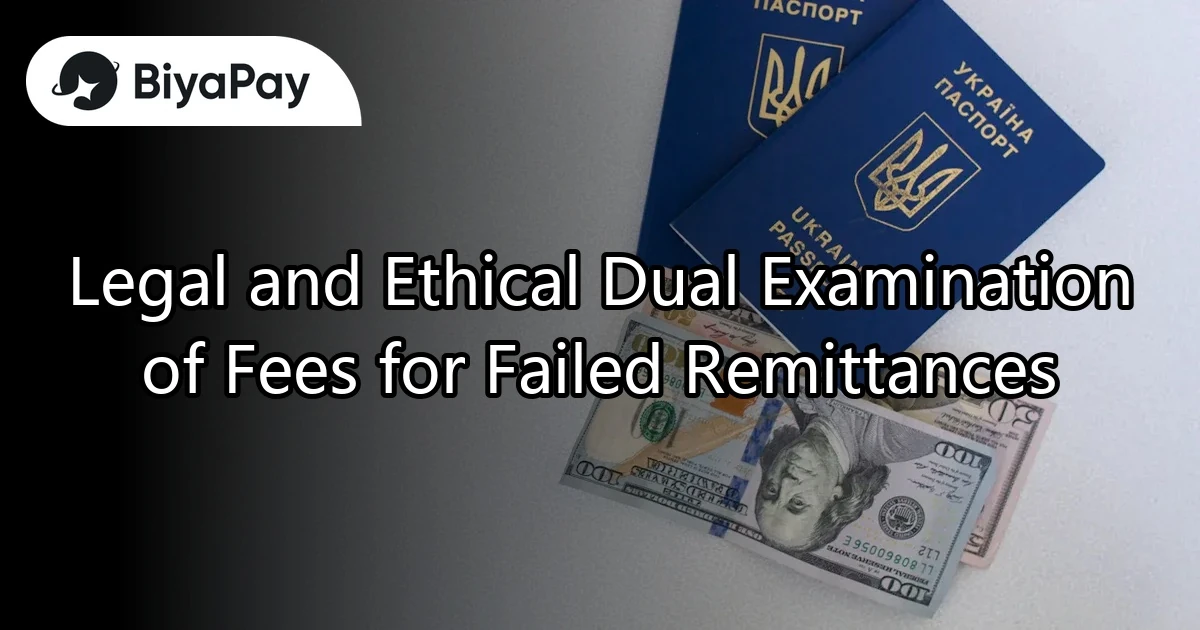- EasyCard
- Trade
- Help
- Announcement
- Academy
- SWIFT Code
- Iban Number
- Referral
- Customer Service
- Blog
- Creator
Legal and Ethical Dual Examination of Fees for Failed Remittances

Image Source: pexels
Have you ever been charged a fee due to a failed remittance when processing a bank transfer? This phenomenon is very common in China. For example, a consumer transferring $10,000 through ICBC was charged approximately $6.2 in fees despite the transaction failing. Consumers feel dissatisfied, believing that banks should bear responsibility for failed services. Such fees have become an industry norm in many Chinese banks, but their reasonableness is highly questioned. Should banks charge fees for failed remittances? You need to examine this issue from both legal and ethical perspectives to understand whether these charges are truly fair.
Reasons for Remittance Failures and the Current State of Bank Fees

Image Source: pexels
Common Reasons for Remittance Failures
When processing a bank transfer, you may encounter various failure scenarios. Below are some common reasons for remittance failures:
- Incorrect Account Information: Entering an incorrect recipient account number or bank code can prevent the transaction from completing.
- Insufficient Balance: If the account balance is insufficient to cover the remittance amount and fees, the bank will reject the transaction.
- Cross-Border Restrictions: Some countries or regions have strict regulatory requirements for cross-border remittances, which may lead to transaction failures.
- Technical Issues: Bank system failures or network interruptions can also hinder the smooth processing of remittances.
Among these reasons, some are the responsibility of the customer, while others are related to the bank’s system or policies. Understanding these scenarios can help you prepare better before initiating a remittance, avoiding unnecessary trouble.
Industry Norms and Controversies Surrounding Bank Fees
In China, banks typically charge a fee for failed remittance transactions. For example, Hong Kong banks may deduct $5 to $10 in fees for failed cross-border remittances. This practice is considered an industry norm, with banks justifying it as covering “service costs.”
However, this norm has sparked widespread controversy. Many consumers believe that banks should not charge fees since the transaction was not successful. Some also question the transparency of fee standards, arguing that banks fail to clearly explain the basis for these charges.
Tip: When choosing banking services, you can review fee policies in advance to avoid unnecessary costs due to information asymmetry.
Discrepancies in Responsibility Allocation Between Customers and Banks
After a remittance failure, customers and banks often disagree on responsibility. Customers typically believe that banks, as service providers, should be accountable for failed transactions. Banks, however, emphasize that many failures result from customer errors, such as incorrect information entry or failure to meet remittance conditions.
This discrepancy leads to numerous complaints and disputes. You may find that banks, when addressing these issues, tend to prioritize protecting their own interests, often overlooking consumers’ sentiments. This phenomenon further fuels consumer doubts about the reasonableness of bank fees.
Legal Examination: The Legality of Bank Fees
Current Legal Regulations on Bank Fees
You may wonder whether Chinese law explicitly regulates bank fee practices. According to current laws and regulations, commercial banks must comply with a series of provisions regarding fees. Below is a summary of relevant regulations:
| Regulation | Content |
|---|---|
| Article 32 | Commercial banks shall diligently handle and promptly respond to customer complaints and establish a corresponding complaint self-inspection mechanism. |
| Article 33 | Commercial banks shall refuse any entity or individual from directly charging customers fees through bank channels. |
| Article 34 | Violations of these regulations will be handled by regulatory authorities in accordance with relevant laws and regulations. |
These provisions indicate that banks must not only comply with legal requirements in their fee practices but also promptly address customer complaints. You can use these legal provisions to understand the boundaries and regulatory requirements of bank fee practices.
Legal Basis Analysis for Fees on Failed Remittances
Does charging fees for failed remittances have a legal basis? You can find answers in the following cases:
- When determining the validity of a reinsurance contract, the court emphasized the importance of financial security and conducted a detailed analysis of relevant records. This suggests that fee practices need to consider the security of financial services comprehensively.
- In trust contracts, the court noted that as long as they do not violate laws and regulations, fee responsibilities should be determined based on specific commitment documents. This reflects the principle of party autonomy.
- When banks fulfill account restriction obligations, they must ensure the reasonableness and legality of measures. The court negatively evaluated improper control measures, emphasizing the protection of depositors’ rights.
These cases show that the legal basis for bank fee practices is typically related to financial security, party autonomy, and depositor rights protection. You can use this analysis to understand the legal logic behind fee practices.
Potential Legal Controversies
Despite some legal regulations governing bank fee practices, controversies persist. Below are some common points of contention:
- In handling patent infringement cases, the court emphasized the determination of the duration of infringement and compensation amounts. This approach may lead to similar controversies in bank fee issues, such as whether fee amounts are reasonable.
- In a case involving a Yichang pharmaceutical company, the company failed to prove its sales activities, and the court ruled it only provided technical support. This case may raise questions about bank fee practices, such as whether banks actually provided services.
- Regarding compensation amounts, the court noted that the first-instance ruling did not reasonably consider the nature and scope of the licensing agreement. This may prompt questions about whether bank fee standards align with the scope of services provided.
These points of contention indicate that there is still room for improvement in the legal framework governing bank fee practices. You can explore these cases further to consider the reasonableness and legality of fee practices.
Ethical Examination: Are Fees Socially Fair?
Balancing Consumer Rights and Bank Responsibilities
How do banks balance consumer rights with their own responsibilities when providing financial services? This is a question worth pondering. You may notice that banks often emphasize their operational and service costs, arguing that fees are reasonable. However, from a consumer’s perspective, does this reflect fairness?
The following data can help you better understand the current state of consumer rights in financial services:
| Year | Number of Bank Wealth Management Products Issued | Funds Raised (Trillion USD) | Number of Investors (Million) |
|---|---|---|---|
| 2020 | 69,000 | 124.56 | 41.62 |
These data show the extensive reach and influence of financial services. You can see that banks bear significant fund management responsibilities in their services, but they also need to be accountable for consumer rights. For example, in a case involving two fund products for the same financier, the court issued conflicting rulings on the financial institution’s responsibilities. This inconsistency highlights the complexity of legal applications and underscores the controversy surrounding banks’ responsibility allocation.
You may ask whether banks should bear more responsibility for service failures. The answer is not straightforward. Banks need to find a balance between protecting their interests and safeguarding consumer rights.
Do Fees Align with Social Ethical Standards?
From an ethical perspective, do bank fees align with society’s common values? You can consider this from the following aspects:
- Should Fees Be Charged for Failed Services?: When banks fail to complete a remittance service, is it reasonable to charge fees? Many consumers believe fees should be tied to service quality. If the service is not completed, charging fees may be seen as unethical.
- Transparency of Fee Standards: Have banks clearly explained the basis and standards for fees to you? A lack of fee transparency may make consumers feel deceived, leading to a trust crisis.
- Social Responsibility: As financial institutions, should banks take on more social responsibility? For example, in cases of remittance failures due to technical issues, should banks proactively waive fees?
You may find that banks’ performance on these issues is not always satisfactory. In 2020, multiple financial product defaults occurred in the financial market, such as the failure of New Times Trust and Tianan Property Insurance trust products to redeem. These incidents reflect rising financial consumption risks and remind you to pay attention to banks’ ethical responsibilities in fee practices.
Impact on Vulnerable Groups and Fairness Considerations
Bank fees have a particularly significant impact on vulnerable groups. You may notice that low-income individuals and consumers in rural areas are at a disadvantage in financial services. Their ability to bear bank fees is lower, and unfair fee policies may exacerbate social inequality.
Below are key points to consider:
- Economic Burden: For low-income individuals, a few dollars in fees can be a significant expense. Have banks taken this into account?
- Information Asymmetry: Vulnerable groups often lack financial knowledge and may not understand the details of fee policies. This information asymmetry puts them at a disadvantage in financial transactions.
- Social Fairness: Should banks offer more favorable fee policies for vulnerable groups? For example, could Hong Kong banks introduce fee-free remittance services for low-income customers?
You can see that these issues involve not only economic aspects but also social fairness and ethical responsibilities. When formulating fee policies, banks should consider the needs of vulnerable groups more, demonstrating respect for social fairness.
Improvement Suggestions: Pathways to Resolve Fee Disputes for Failed Remittances

Image Source: pexels
Policy Adjustment Suggestions: Clarifying Fee Standards and Transparency
You may find that the lack of transparency in bank fee standards is a primary source of consumer complaints. To reduce disputes, governments and banks can draw on successful experiences from other countries to establish clearer fee policies. For example:
- Australia, through an open government licensing framework, categorizes data reuse authorization licenses into four types and adopts different authorization models and fee standards.
- The New Zealand government compiled an “Information Asset Catalog Template” and established a “Data Investment Framework,” providing specific guidance for data reuse.
These cases demonstrate that clear fee standards and transparent policies can effectively enhance consumer trust in banking services. You can suggest that banks detail the basis and standards for fees on their websites or in service agreements, giving consumers clearer expectations when selecting services.
Specific Measures to Improve Bank Service Quality
Improving bank service quality is a key way to reduce remittance failures. You can see potential improvements in the following areas:
- Optimize Technical Systems: Banks should regularly upgrade systems to minimize transaction failures due to technical issues.
- Enhance Employee Training: Bank staff need to acquire more professional knowledge to help customers avoid failures due to incorrect information entry.
- Provide Real-Time Feedback: Banks can notify customers of transaction statuses via SMS or apps, helping them identify issues promptly and take action.
These measures can not only reduce the reasons for remittance failures but also improve customer satisfaction with banking services.
Strengthening Consumer Education and Rights Awareness
Consumer education is a critical factor in resolving fee disputes. You may notice that many consumers are at a disadvantage in transactions due to a lack of financial knowledge. Below are some research data:
- The primary income source for college students is family living expenses, and they prioritize cost-effective consumption.
- Rights protection scenarios are concentrated in “prohibiting self-brought alcohol” and “online shopping issues,” but the rights protection process is lengthy with low success rates.
These data indicate that consumers need more education and support. Banks can help consumers understand fee policies and rights protection pathways by holding seminars, publishing educational articles, or offering online courses. You can also enhance your rights awareness and capabilities by studying typical cases.
Conclusion
Legal analysis shows that bank fees for failed remittances have a certain degree of legality. You can see that fee practices comply with current legal provisions, but ethical examination reveals fairness issues. The lack of transparency in fee standards and their impact on vulnerable groups have caused dissatisfaction among many consumers.
Tip: Banks need to balance legal compliance with social fairness in their fee practices.
You can call on banks and regulators to take action to prioritize consumer rights. Through policy adjustments and service improvements, banks can enhance transparency, reduce disputes, and earn greater consumer trust.
FAQ
1. Why Do Banks Still Charge Fees for Failed Remittances?
Banks explain that fees cover service costs, such as system maintenance and manual processing expenses. Even if a transaction fails, banks still perform some backend operations. These costs are typically seen as the basis for fees.
2. What Can You Do If You’re Dissatisfied with Bank Fees?
You can first communicate with bank customer service to understand the fee basis. If the issue remains unresolved, you can file a complaint with financial regulators or pursue legal action to protect your rights. Keeping transaction records and fee receipts is crucial.
3. How Can You Avoid Extra Fees Due to Failed Remittances?
Before initiating a remittance, carefully verify recipient information and account balance. Choose reputable banks, such as Hong Kong banks, and review their fee policies. Use real-time feedback features provided by banks to ensure transactions are completed smoothly.
4. Can Vulnerable Groups Apply for Fee Waivers?
Some banks may offer preferential policies for low-income individuals, such as fee waivers or reduced charges. You can consult bank customer service to check eligibility for such conditions.
5. Are Banks Obligated to Disclose Fee Standards?
According to legal provisions, banks must clearly disclose fee standards and their basis. You can find this information on bank websites or in service agreements. If fees lack transparency, you can report the issue to regulators.
Failed remittances often incur fees, leaving users frustrated by unfair charges, lack of transparency, and technical issues. BiyaPay offers a better solution, supporting conversions across 30+ fiat currencies and 200+ cryptocurrencies with remittance fees as low as 0.5%, covering 190+ countries with same-day delivery. BiyaPay ensures fund safety and accelerates processing, reducing risks from account errors or system failures. Join BiyaPay now for transparent, low-cost cross-border remittances! You can also invest in U.S. and Hong Kong stocks directly on the BiyaPay platform without needing an additional overseas account, enhancing capital efficiency. Idle funds can earn a 5.48% APY through current investment products, backed by BiyaPay’s U.S. MSB and SEC licenses. Sign up with BiyaPay for a fair, efficient global transfer experience!
*This article is provided for general information purposes and does not constitute legal, tax or other professional advice from BiyaPay or its subsidiaries and its affiliates, and it is not intended as a substitute for obtaining advice from a financial advisor or any other professional.
We make no representations, warranties or warranties, express or implied, as to the accuracy, completeness or timeliness of the contents of this publication.




Contact Us
Company and Team
BiyaPay Products
Customer Services
is a broker-dealer registered with the U.S. Securities and Exchange Commission (SEC) (No.: 802-127417), member of the Financial Industry Regulatory Authority (FINRA) (CRD: 325027), member of the Securities Investor Protection Corporation (SIPC), and regulated by FINRA and SEC.
registered with the US Financial Crimes Enforcement Network (FinCEN), as a Money Services Business (MSB), registration number: 31000218637349, and regulated by FinCEN.
registered as Financial Service Provider (FSP number: FSP1007221) in New Zealand, and is a member of the Financial Dispute Resolution Scheme, a New Zealand independent dispute resolution service provider.



















